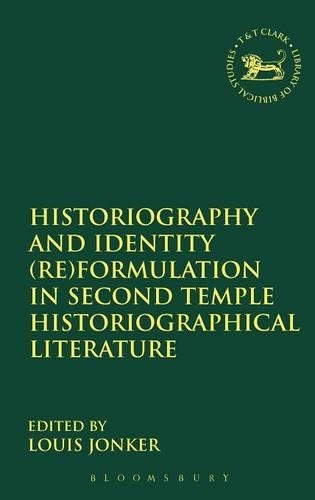
Historiography and Identity (Re)formulation in Second Temple Historiographical Literature
(Hardback)
Available Formats
Publishing Details
Historiography and Identity (Re)formulation in Second Temple Historiographical Literature
By (Author) Professor Louis Jonker
Bloomsbury Publishing PLC
T.& T.Clark Ltd
13th January 2011
United Kingdom
Classifications
General
Non Fiction
Criticism and exegesis of sacred texts
222.095
Physical Properties
Hardback
192
Description
It is commonly accepted in various disciplines and contexts that history writing often (if not always!) contribute to the process of identity (re)formation. Using the past in order to find a renewed identity in new (socio-political and socio-religious) circumstances, is something that we also witness in Hebrew Bible historiographies. The so-called Deuteronomistic History, as well as the works of Chronicles and Ezra-Nehemiah, are often read from the perspective of a community trying to find a new identity in changed circumstances.
In the Historical Books section at the 2008 Auckland SBL International Meeting, this perspective was investigated further. The papers presented included theoretical reflections on the relationship between historiography and identity (re)formation, as well as illustrations from Hebrew Bible historiographies (of the Exilic and Second Temple periods). These papers, together with a few responses to the papers, are offered here to a wider scholarly audience.
Contributors include Jon Berquist, Mark Brett, Louis Jonker, Mark Leuchter, Christine Mitchell, Klaas Spronk, Gerrie Snyman, Ray Person, Armin Siedlecki, and Jacob Wright.
Reviews
An engaging and diverse set of essays tackling difficult issues of ethnicity, nationality, and power in early Second Temple times. --Gerald N. Knoppers, Edwin Erle Sparks Professor of Classics and Ancient Mediterranean Studies, Religious Studies, and Jewish Studies, Penn State University
I enjoyed reading this thoughtful and thought-provoking volume. It brings to the forefront numerous issues that deserve much attention among those interested in questions of ancient Israelite historiography, social memory, identity formation during the Persian and Hellenistic period . The variety of approaches exemplified in the volume enhances its usefulness and invites further reflection. Highly recommended. --Ehud Ben Zvi, History and Classics, University of Alberta
Author Bio
Louis Jonker is Associate Professor in the Department of Old and New Testament, University of Stellenbosch, South Africa.
